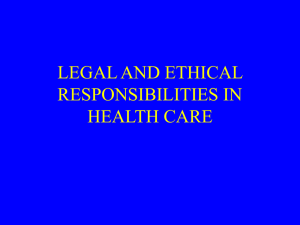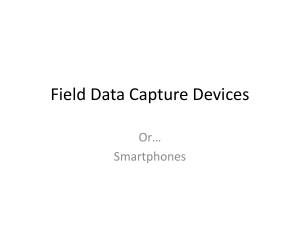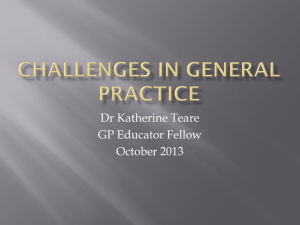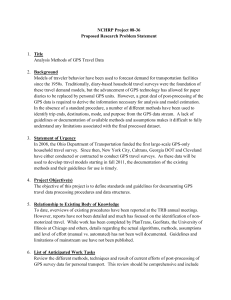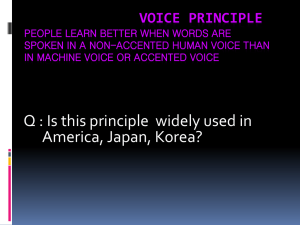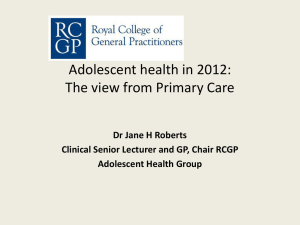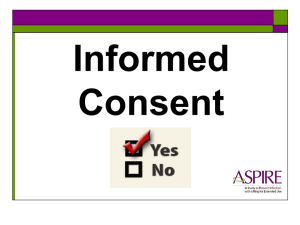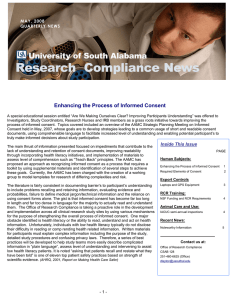The case of Mr C
advertisement
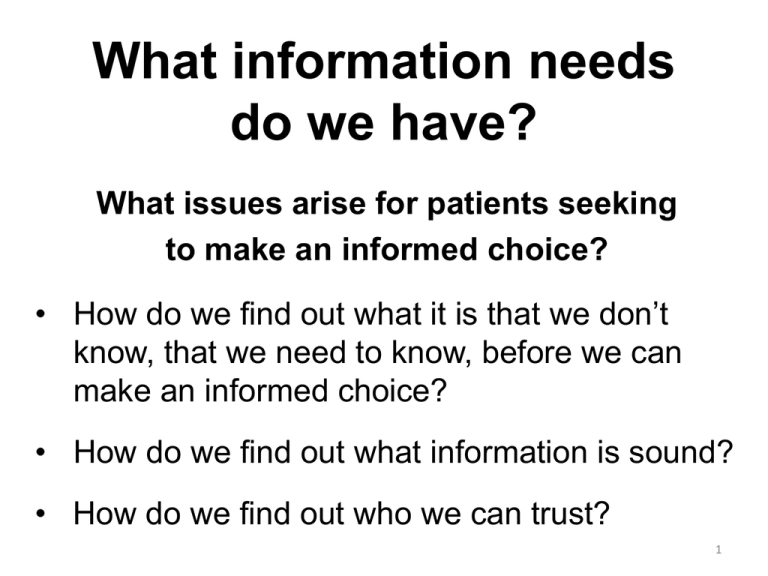
What information needs do we have? What issues arise for patients seeking to make an informed choice? • How do we find out what it is that we don’t know, that we need to know, before we can make an informed choice? • How do we find out what information is sound? • How do we find out who we can trust? 1 Moving from Informed Consent to Informed Choice When asked about the Duke of Edinburgh going into hospital for an exploratory operation, a Royal spokesman replied, “The best way to get better is to do what the Doctor says.” A study of women with breast cancer showed that 44% wanted to be involved in joint decision making about their treatment plan, 22% wanted time alone to consider the options, whereas 34% wanted their doctor to make the choice for them. 2 Nota Bene When thinking about shared decision making we need to restrict our focus to options for treatment, probable outcomes, risks, special tests, care management and support packages Our main interest here is not about choice of facilities, service providers, hospitals, consultants’ performance or hospital league tables or how good the parking is! Unfortunately much work does not make this distinction clearly enough – (e.g. An Anatomy of GP Referral Decisions – King’s Fund 2007) 3 How do we feel about choice at times when making such decisions 1. Are we in “our right minds” at such times? 2. Can we absorb information we are given? 3. How best can such information be given to us? 4. How do our own beliefs affect such choices? 5. Who do we believe? 4 The case of Mr C Mr C was a patient in a Broadmoor hospital who had chronic paranoid schizophrenia with grandiose delusions of being a world famous doctor. He developed gangrene in his right foot. He refused to consent to amputation of his right leg below the knee. He sought an injunction to restrain his doctors from amputating the leg without his express consent. In granting the injunction, Justice Thorpe held that C sufficiently understood the nature, purpose, and effects of the proposed amputation, and that he retained capacity to consent to, or refuse, medical treatment. Justice Thorpe laid out the criteria for capacity, which were subsequently cited in other cases, and have become generally known as “the Re C test” 5 The Requirements for Informed Choice The High Court held that an adult has capacity to consent [or refuse consent] to medical treatment if he or she can: • understand and retain the information relevant to the decision • believe that information, and • weigh that information in the balance to arrive at a choice Therefore to demonstrate capacity, individuals should be able to: 1. 2. 3. 4. 5. understand in simple language what the medical treatment is, its purpose and nature and why it is being proposed understand its principal benefits, risks and alternatives understand in broad terms what will be the consequences of not receiving the proposed treatment retain the information for long enough to make an effective decision, and make a free choice (i.e. free from pressure) 6 What defines our competence to engage in critical decision-making? • Rational belief system – in the context of NHS commitment to equality & diversity • Sensible attitude to health and wellbeing • Intelligent understanding in our attribution of the causes of illness • Well-balanced emotional response to bad news or shock • Supportive family or social network 7 Working through our defences when time is of an essence • My coronary artery disease - radiological evidence before me that I could understand – wish to be a good patient – happy to adopt learned helplessness position - trust of cardiologist overshadowed any fear of risks – good level of knowledge helped – chose CABG • Bob’s multiple myeloma – Low confidence in allopathic medicine – preference for alternative therapies – asked to record Registrar’s advice on Dictaphone – declined chemo • Gill’s breast lump – biopsy unclear but suggested tissue unhealthy - ? Pre-cancerous – we easily shared consultant’s risk aversive position – if cancer was developing, best deal with it sooner rather than later – chose lumpectomy 8 What did I learn from these experiences? • Trust in physicians is still pretty strong for all of us despite cultural shift toward consumerism • Knowledge and clear information reduces fear • Confidence to ask questions helps – inability to take in answers doesn’t • Time pressure is often a critical factor in making choices relating to life-threatening situations • Paradoxically, the crisis or the point of decision making is often the worst time to actually make it NB It is not the time to debate the ethics of blood transfusion with a Jehovah’s Witness when a family member is critically ill in A & E! • Pain, fear, denial, affect us all very differently 9 On what kind of data do GPs advise us? 4 factors influence the degree to which GPs support patient choice: 1. The availability and quality of formal and informal information about services 2. GPs’ views of their professional role (many see no benefits for their patients) 3. Patient preferences 4. Local PCT (now CCG) policies that may restrict choice Most GPs distrusted official sources of information (waiting list data etc) preferring to rely on soft, informal sources of information – (my surgeon’s reputation was that he was the fastest seamster in the business!) “When making choices about themselves or a relative, GPs often seek out informal information about different services to inform their personal decisions, with a particular emphasis on clinical quality.” Anatomy of GP Referral Decisions – King’s Fund 2007 10 Does more information increase our trust? • “From the state of current knowledge, around 13% of all treatments have good evidence, and a further 21% are likely to be beneficial”. Ben Goldacre 2008 Q. Are Randomised Controlled Trials the holy grail of evidence based medicine – Prophylactic beta blockers use following heart disease? CBT for agoraphobia? • In her Reith lecture, the philosopher, Baroness O’Neill presents cogent arguments as to how information and transparency can diminish our trust in “expert” opinion. Q. How many of us place trust in everything the pharmaceutical industry tells us? 11 “Perhaps it is not then surprising that public distrust has grown in the very years in which openness and transparency have been so avidly pursued. Transparency certainly destroys secrecy: but it may not limit the deception and deliberate misinformation that undermine relations of trust. If we want to restore trust we need to reduce deception and lies rather than secrecy.” “We place and refuse trust not because we have torrents of information (more is not always better), but because we can trace specific bits of information and specific undertakings to particular sources on whose veracity and reliability we can run some checks. Well-placed trust grows out of active enquiry rather than blind acceptance” Onora O’Neill 2002 12 What sort of information do we need? • Access to basic anatomy and physiology learning tools – including the models and skeletons found lurking around in store cupboards of medical schools! • Easy to use jargon-busters and glossaries of medical terms • Decision-making aids • Access to on-line journals and search tools with library staff assistance where needed • Lists of support groups and organisations that produce information media 13 Have I answered my questions? • We find out what it is that we need to know by asking questions of our GPs, consultants, friends or relatives involved in healthcare, by talking with others who have been through what we may be facing, by joining support groups and maybe seeking advice through library services • We make judgements (mostly unscientific) about how much we trust information based upon the informants personal attributes, our own biases, the political milieu, and whether we feel we have been properly listened to • Much depends upon hearsay, the experience of others, how much we really want to know, whether we read the Mail, the Sun or the Guardian, lastly whether we would prefer to leave it to somebody else (“the professionals”) whether or not we truly believe what they are telling us 14 Final comments • Shared decision-making may be merely a euphemism for Drs talking their patients around to accepting their prescription! • It is only of real benefit where there are genuine alternative ways forward in our medical journey • We must not assume that in making choices we all become entirely self-centred – consideration of family, friends and carers often has much sway in some of the most difficult decisions we have to make 15


